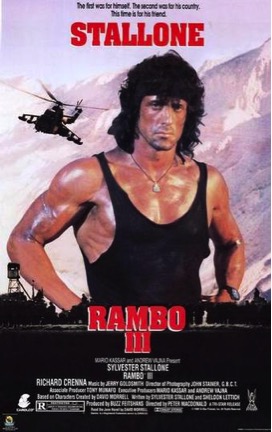“What if it turns out Rambo III was really good?”
-Paula Poundstone [1]
Last weekend I watched Rambo III for the first time. I was only 29 years late. I barely remember when it came out in 1988. It was kind of a dud. I clearly remember when Rambo: First Blood Part II came out in 1985. That movie captured the popular imagination.
If you missed it, this is the basic story: Something bad happened to someone behind enemy lines and Rambo goes in alone to fight an entire army to set the captive free. This was also what happened in the original Rambo too, but three decades later, we might see this movie through a different set of eyes.
Spoiler Alert
Here, I should offer a spoiler alert, but if you have not seen the movie over the past three decades, you are not likely to do so in the future. Nevertheless, if you are intent on seeing the movie, look away now.
So this is what happened: Rambo is minding his business in Thailand fixing up a Buddhist temple, finally finding peace. When a U.S. Embassy official informs him that his friend, Colonel Trautman has been taken captive by the Soviets, he decides to leave his newfound peace and return to his former life of killing lots of bad guys.
This time, the battlefield was in Afghanistan. The Afghan war was winding down when the movie was released in 1988. A year earlier, Gorbachev announced that he would start withdrawing Soviet forces.
In the movie, Colonel Trautman was sent to supply the Afghan Mujahideen with missiles to fight the Soviets who had occupied Afghanistan since the invasion in 1979. If you recall, the US boycotted the 1980 Olympics over this Soviet aggression.[2] Trautman is a fictional character, but the United States did supply the Mujahideen with stinger missiles in 1986.
Watching the movie in 2017 is remarkable. Because the Soviets are still the bad guys, the Mujahideen are depicted as sympathetic figures, simply fighting for the oppressed. When Rambo appeals to a tribe for help in rescuing his friend, a tribal leader explains:
My name is Masoud. You must not judge us, before you understand why we are not directed to help. Most of the Afghan people are very strong, and we are determined not to be driven from our land. Our children die of disease, mines, and poison gas. And our women are raped and killed. Last year, in the valley of Legman, the next valley, Pregnant women were cut with bayonets, and their babies thrown into the fire. This is done, so they will not have to fight the next generation of Afghans. Yet nobody sees anything, or reads anything in the papers. What you see here, are the Mujahedin soldiers, holy warriors. To us, this war is a holy war. And there is no true death for a Mujahedin, because we have taken our last nights, and because we consider us already dead. To us, death for our land and God is an honor.
After Rambo breaks Colonel Trautman out of prison, and they thought that they had escaped, they were surrounded by a huge Soviet army with tanks and helicopters. All appeared hopeless, but they were rescued by the Mujahideen, riding in on horseback like the cavalry in an old Western. They were the good guys because the Soviets were the bad guys and a number of important geopolitical events had not yet happened.
In real-life, the Mujahideen inflicted serious losses on the Soviets. Afghanistan was the Soviet Union’s Vietnam, but after expelling the Soviets, the Mujahideen went on to fight their own civil war, overthrow the Afghan government, and impose strict Wahabi Islamic sharia law (from which the Taliban emerged in 1994 as the victors).
Again, in real life, the Taliban were little better—and perhaps more oppressive—than their Soviet enemies. According to the U.S. State Department:
Prior to the rise of the Taliban, women in Afghanistan were protected under law and increasingly afforded rights in Afghan society. Women received the right to vote in the 1920s; and as early as the 1960s, the Afghan constitution provided for equality for women. There was a mood of tolerance and openness as the country began moving toward democracy. Women were making important contributions to national development. In 1977, women comprised over 15% of Afghanistan’s highest legislative body. It is estimated that by the early 1990s, 70% of schoolteachers, 50% of government workers and university students, and 40% of doctors in Kabul were women. Afghan women had been active in humanitarian relief organizations until the Taliban imposed severe restrictions on their ability to work….
Afghanistan under the Taliban had one of the worst human rights records in the world. The regime systematically repressed all sectors of the population and denied even the most basic individual rights. Yet the Taliban’s war against women was particularly appalling.
Women are imprisoned in their homes, and are denied access to basic health care and education. Food sent to help starving people is stolen by their leaders. The religious monuments of other faiths are destroyed. Children are forbidden to fly kites, or sing songs… A girl of seven is beaten for wearing white shoes.
— President George W. Bush, Remarks to the Warsaw Conference on Combating Terrorism, November 6, 2001[3]
Ultimately, Osama Bin Laden found a hospitable environment for Al Quaeda (Literally “the base”) with the Mujahideen as early as 1987, the year before Rambo III was produced. Bin Laden and the Taliban regime mutually supported one another. We would become aware of all of this only after 9/11.
The Perspective of Time
They say that hindsight is 20/20. It might not be that clear, but in hindsight, some of the pro-Afghan messaging in the movie was a bit creepy. For instance, a local fighter explained to Rambo how Afghanistan had never been conquered:
This is Afghanistan. Alexander the Great tried to conquer this country, then Ghenghis Khan, then the British, now Russia. But Afghan people fight hard, they never be defeated. Ancient enemy make prayer about these people. Do you wish to hear? Very good. It says: “May God deliver us from the venom of the cobra, teeth of the tiger, and the vengeance of the Afghans.” Understand what this means?
Earlier, the U.S. Embassy official lectured Rambo:
I don’t know how much you know about Afghanistan. Most people can’t even find it on a map! But over two million civilians, mostly peasants farmers and their families, have been systematically slaughtered by invading Russian armies. Every new weapon, including chemical warfare, has been used to eliminate these people. And they’ve been very successful, at many levels. I assume that you’re out of touch with the current states of the war. But after nine years of fighting, the Afghan Forces are now getting their Stinger missiles, and are now beginning to hold their own against the Air-Strikes.
Later, Colonel Trautman tells his Soviet torturer:
Everyday, your war machines lose ground to a bunch of poorly armed,
poorly equipped freedom-fighters! The fact is that you underestimated your competition. If you studied your history, you’d know this people never gave up to anyone. They’d rather die than be slaves to an invading army.
You can’t defeat a people like that. We tried. We already had our Vietnam! Now you’re gonna have yours!
The movie was even dedicated “TO THE GALLANT PEOPLE OF AFGHANISTAN.”
At the end of the movie, one of the Mujahideen fighters invited Rambo to stay and in Afghanistan to continue to fight the Soviets:
“You’re sure you don’t want to stay? You fight good for a tourist!”
Rambo replied, “Maybe next time.”
I suppose if he did return, it would be after the 2001 U.S. invasion of Afghanistan, which might have been awkward since Rambo would have switched sides.
What is the Point?
I told you all of that to tell you this: Sylvester Stallone could not possibly have known what would transpire over the next few decades when he filmed the movie, but ironically, Rambo III led me to wax philosophical and reflect on life. You would expect that from the Matrix or Life is Beautiful, but not by Rambo III. But I walked away with two thoughts: What trends can’t I see now that will affect me in the next decade? And, What will I think when I look back at my life thirty years from now?
[1] Poundstone, P. (2009). Cats, cops, and stuff… [Video file]. Retrieved from https://www.youtube.com/watch?v=VLLP1Wtrg0U
[2] Carter announces Olympic boycott (n.d.). The History Channel. Retrieved from http://www.history.com/this-day-in-history/carter-announces-olympic-boycott
[3] The Taliban’s war against women (2001, November 17). U.S Department of State. Retrieved from https://www.state.gov/j/drl/rls/6185.htm
______________

Dr. Darin Gerdes is an Associate Professor of management in the School of Business at Charleston Southern University. All ideas expressed on www.daringerdes.com are his own.
This post was originally created for Great Business Networking (GBN), a networking organization for business professionals where Dr. Gerdes is the Director of Education.
______________


